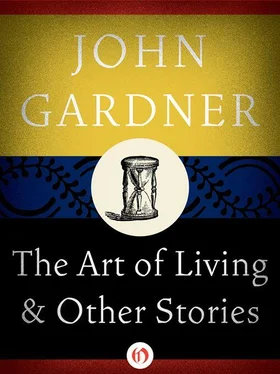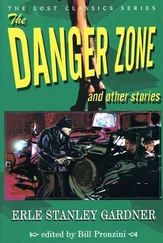Nimram’s ears popped. They were beginning the long descent. After a moment he said, “Actually, I haven’t been strictly honest with you either. I’m not really in business.”
She looked at him, waiting with what seemed to him a curiously childish eagerness.
“I’m a symphony conductor.”
“Are you really?” she asked, lowering her eyebrows, studying him to see if he was lying. “What’s your name?”
“Benjamin Nimram,” he said.
Her eyes narrowed, and the embarrassment was back. He could see her searching her memory. “I think I’ve heard of you,” she said.
“ Sic transit gloria mundi, ” he said, mock-morose.
She smiled and pushed her hair back. “I know what that means,” she said.
The no-smoking sign came on. In the distance the earth was adazzle with lights.
In the lounge at O’Hare he spotted his wife at once, motionless and smiling in the milling crowd — she hadn’t yet seen him — her beret and coat dark red, almost black. He hurried toward her. Now she saw him and, breaking that stillness like the stillness of an old, old painting, raised her arm to wave, threw herself back into time, and came striding to meet him. He drew off and folded the dark glasses.
“Ben!” she exclaimed, and they embraced. “Honey, you look terrible!” She pulled back to look at him, then hugged him again. “On TV it said there was a thunderstorm in L.A., one of the worst ever. I was worried sick!”
“Now now,” he said, holding her a moment longer. “So how were Poppa and Momma? “
“How was the flight?” she asked. “I bet it was awful! Did the man from the kennel come for Trixie?”
He took her hand and they started, moving with long, matched strides, toward the terminal.
“Trixie’s fine, the flight was fine, everything’s fine,” he said.
She tipped her head, mocking. “Are you drunk, Benjamin?”
They veered out, passing an old couple inching along on canes, arguing.
“I met a girl,” he said.
She checked his eyes. “Pretty?” she asked — laughingly, teasingly; but part of her was watching like a hawk. And why not, of course. He’d been married twice before, and they were as different, she and himself, as day and night. Why should she have faith? He thought again of the conviction he’d momentarily felt that the girl was her daughter. Sooner or later, he knew, he would find himself asking her about it; but not now. Scared and stupid , he thought, remembering, and the tuck at the corner of his mouth came back. He got an image of Noah’s Ark as a great, blind, dumb thing nosing carefully, full of fear, toward the smell of Ararat.
“Too young,” he said. “Practically not yet of this world.”
They were walking very fast, as they always did, gliding smoothly past all the others. Now and then he glanced past his shoulder, hoping to spot Anne Curtis; but it was absurd, he knew. She’d be the last of the last, chattering, he hoped, or doing her tragic act. Arline’s coat flared out behind her and her face was flushed.
Almost as soon as she stepped off the plane, Anne Curtis found out from her father who it was that had befriended her. The following night, when Nimram conducted the Chicago Symphony in Mahler’s Fifth, she was in the audience, in the second balcony, with her parents. They arrived late, after the Water Music, with which he had opened the program. Her father had gotten tickets only at the last minute, and it was a long drive in from La Grange. They edged into their seats while the orchestra was being rearranged, new instruments being added, the people who’d played the Handel scrunching forward and closer together.
She had never before seen a Mahler orchestra — nine French horns, wave on wave of violins and cellos, a whole long row of gleaming trumpets, brighter than welders’ lights, another of trombones, two rows of basses, four harps. It was awesome, almost frightening. It filled the vast stage from wingtip to wingtip like some monstrous black creature too enormous to fly, guarding the ground with its head thrust forward — the light-drenched, empty podium. When the last of the enlarged orchestra was assembled and the newcomers had tuned, the houselights dimmed, and as if at some signal invisible to commoners, the people below her began to clap, then the people all around her. Now she too was clapping, her mother and father clapping loudly beside her, the roar of applause growing louder and deeper, drawing the conductor toward the light. He came like a panther, dignified yet jubilant, flashing his teeth in a smile, waving at the orchestra with both long arms. He shook hands with the concertmaster, bounded to the podium — light shot off his hair — turned to the audience and bowed with his arms stretched wide, then straightened, chin high, as if revelling in their pleasure and miraculous faith in him. Then he turned, threw open the score — the applause sank away — and for a moment studied it like a man reading dials and gauges of infinite complexity. He picked up his baton; they lifted their instruments. He threw back his shoulders and raised both hands till they were level with his shoulders, where he held them still, as if casting a spell on his army of musicians, all motionless as a crowd in suspended animation, the breathless dead of the whole world’s history, awaiting the impossible. And then his right hand moved — nothing much, almost playful — and the trumpet call began, a kind of warning both to the auditorium, tier on tier of shadowy white faces rising in the dark, and to the still orchestra bathed in light. Now his left hand moved and the orchestra stirred, tentative at first, but presaging such an awakening as she’d never before dreamed of. Then something new began, all that wide valley of orchestra playing, calm, serene, a vast sweep of music as smooth and sharp-edged as an enormous scythe — she had never in her life heard a sound so broad, as if all of humanity, living and dead, had come together for one grand onslaught. The sound ran, gathering its strength, along the ground, building in intensity, full of doubt, even terror, but also fury, and then — amazingly, quite easily — lifted. She pressed her father’s hand as Benjamin Nimram, last night, had pressed hers.
Her mother leaned toward her, tilting like a tree in high wind. “Are you sure that’s him?” she asked.
“Of course it is,” she said.
Sternly, the man behind them cleared his throat.
One day in April — a clear, blue day when there were crocuses in bloom — Jack Hawthorne ran over and killed his brother, David. Even at the last moment he could have prevented his brother’s death by slamming on the tractor brakes, easily in reach for all the shortness of his legs; but he was unable to think, or, rather, thought unclearly, and so watched it happen, as he would again and again watch it happen in his mind, with nearly undiminished intensity and clarity, all his life. The younger brother was riding, as both of them knew he should not have been, on the cultipacker, a two-ton implement lumbering behind the tractor, crushing new-ploughed ground. Jack was twelve, his brother, David, seven. The scream came not from David, who never got a sound out, but from their five-year-old sister, who was riding on the fender of the tractor, looking back. When Jack turned to look, the huge iron wheels had reached his brother’s pelvis. He kept driving, reacting as he would to a half-crushed farm animal, and imagining, in the same stab of thought, that perhaps his brother would survive. Blood poured from David’s mouth.
Their father was nearly destroyed by it. Sometimes Jack would find him lying on the cow-barn floor, crying, unable to stand up. Dale Hawthorne, the father, was a sensitive, intelligent man, by nature a dreamer. It showed in old photographs, his smile coded, his eyes on the horizon. He loved all his children and would not consciously have been able to hate his son even if Jack had indeed been, as he thought himself, his brother’s murderer. But he could not help sometimes seeming to blame his son, though consciously he blamed only his own unwisdom and — so far as his belief held firm — God. Dale Hawthorne’s mind swung violently at this time, reversing itself almost hour by hour, from desperate faith to the most savage, black-hearted atheism. Every sickly calf, every sow that ate her litter, was a new, sure proof that the religion he’d followed all his life was a lie. Yet skeletons were orderly, as were, he thought, the stars. He was unable to decide, one moment full of rage at God’s injustice, the next moment wracked by doubt of His existence.
Читать дальше












